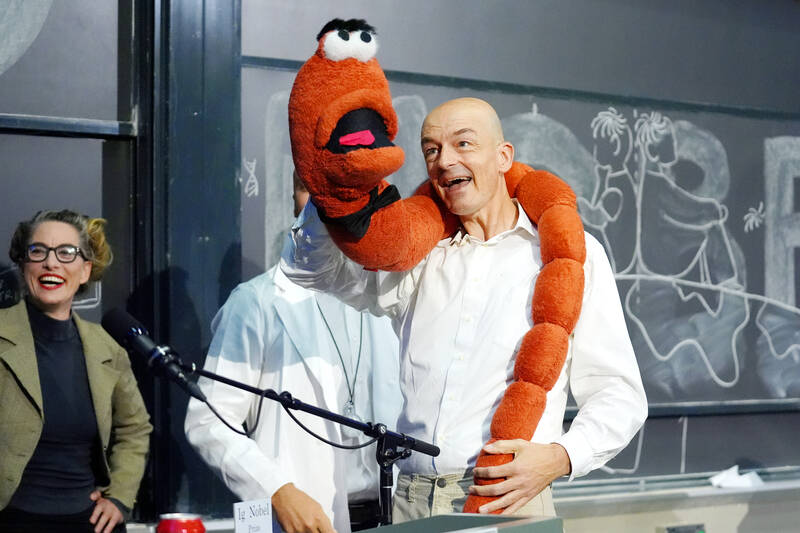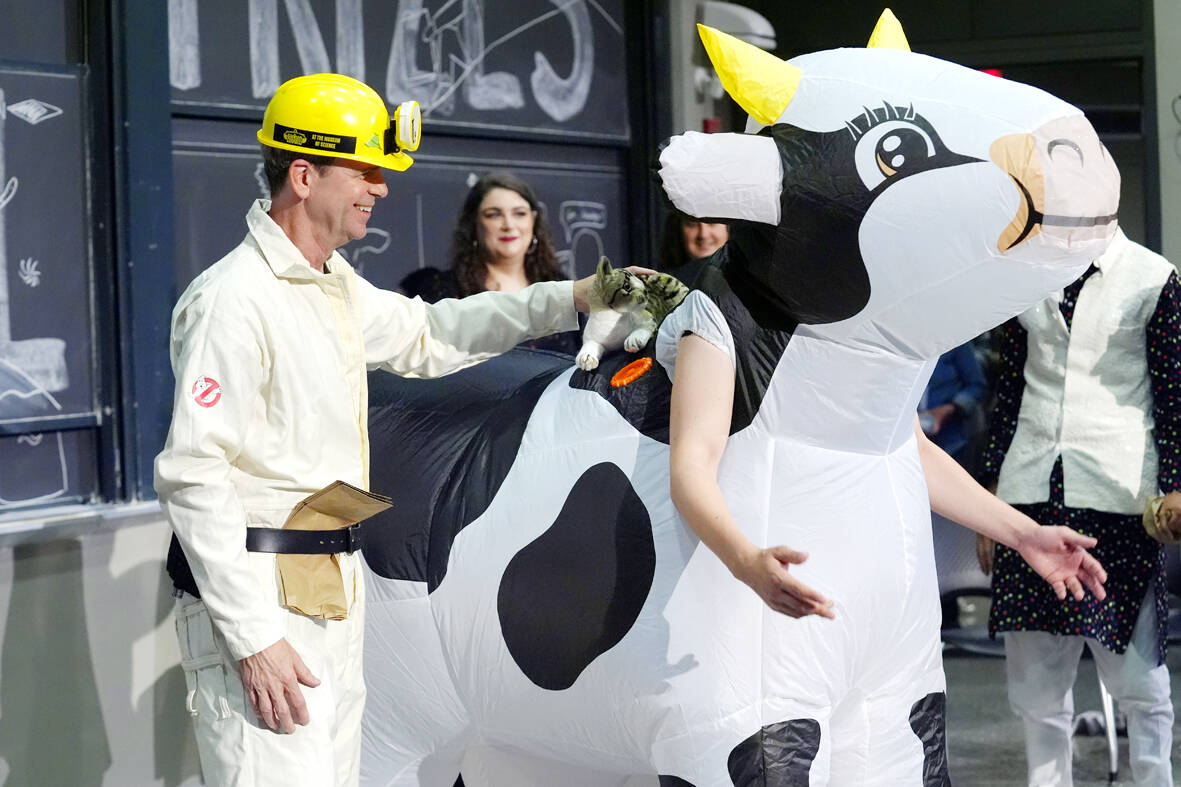In a stark demonstration of how award-winning breakthroughs can come from the most unlikely directions, researchers have won an Ig Nobel prize for discovering that mammals can breathe through their anuses.
After a series of tests on mice, rats and pigs, Japanese scientists found the animals absorb oxygen delivered through the rectum, work that underpins a clinical trial to see whether the procedure can treat respiratory failure.
The team is among 10 recognized in this year’s Ig Nobel awards (see below for more), the irreverent accolades given for achievements that “first make people laugh, and then make them think.” They are not to be confused with the more lucrative and career-changing Nobel prizes to be handed out in Scandinavia next month.

Photo: AP
The latest crop of Ig Nobel winners received their awards at a ceremony at Massachusetts Institute of Technology on Thursday. The event featured real Nobel laureates to distribute the prizes, “24/7” lectures in which experts first explained their subject in 24 seconds, then in seven words, and copious paper-plane throwing.
Other work honored on the night included US research to house pigeons in missiles to help guide them to their targets; UK investigations which found that claims of extreme old age tend to come from areas that have short average lifespans and a historical lack of birth certificates and a French study that found that scalp hair tends to whorl in a clockwise direction, though less so in the southern hemisphere.
The Japanese researchers became interested in whether humans with breathing difficulties might benefit from having oxygen pumped up their backsides after noting that some animals, such as loaches, can use their intestines to breathe. They began the work in the COVID crisis when many hospitals were desperately short of mechanical ventilators to support breathing in people with severe infections.

Photo: AP
The team’s experiments, which earned the Ig Nobel prize in physiology, showed that mice, rats and pigs could absorb oxygen into the bloodstream when it was delivered via the rectum, thus supporting normal breathing. Writing in the journal Med in 2021, Ryo Okabe at Tokyo Medical and Dental University and colleagues described how “enteral ventilation” offered “a new paradigm” to help patients in respiratory failure.
Takanori Takebe, an author of the study at Cincinnati children’s hospital medical center, confessed to “mixed feelings” on hearing of the award, but warmed to it on finding out it was recognized for making people laugh and then think. If it fueled interest in enteral ventilation, he said, “I’d be so happy.” The team is running a phase 1 trial in human volunteers.
Saul Newman at the University of Oxford bagged the demography prize for showing that many claims of people living extraordinarily long lives come from places with short life spans, no birth certificates and where clerical errors and pension fraud abound.
“Extreme old age records are a statistical basket case,” he said. “From the level of individual cases, up to broad population patterns, virtually none of our old-age data makes sense.”
Roman Khonsari, a craniofacial surgeon at the Necker-Enfants Malades university hospital in Paris, and colleagues won the anatomy prize for their global study of hair whorls. While scalp hair spirals in a clockwise direction on most people, their research found, there is more counter-clockwise spiraling in the southern hemisphere.
“I was operating when I got the call,” Khonsari said. “I was extremely glad because, despite the undeniable irrelevance of this study, I am convinced that deciphering patterns in nature can lead to important discoveries on fundamental developmental mechanisms. Shapes carry interesting amounts of information.”
The discovery led to comparisons with tornadoes, which typically rotate in different directions in the northern and southern hemispheres. Writing in the Journal of Stomatology, Oral and Maxillofacial Surgery, the researchers theorized that the Coriolis effect, by which the Earth’s spin deflects winds to the right in the northern hemisphere and to the left in the southern hemisphere, could be at work. Not that Khonsari believes it.
“Frankly, I don’t think it is a plausible hypothesis,” he said.
The other winners of the 2024 Ig Nobel prizes
PEACE
Awarded to the late BF Skinner, a US psychologist, for exploring the feasibility of housing live pigeons inside missiles to guide them to their targets. The project, which Skinner himself described as “crackpot,” was dropped despite a perfect demonstration involving a pigeon trained to target features on the New Jersey coastline.
“The spectacle of a living pigeon carrying out its assignment, no matter how beautifully, simply reminded the committee of how utterly fantastic our proposal was,” Skinner wrote.
BOTANY
Given to Jacob White in the US and Felipe Yamashita in Germany for reporting evidence that the South American plant Boquila trifoliolata can mimic the leaves of plastic plants it is placed alongside, leading them to conclude that “plant vision” is a plausible hypothesis.
MEDICINE
Won by a Swiss, German and Belgian group for demonstrating that fake medicine that causes painful side-effects can be more effective in patients than fake medicine that does not cause painful side-effects.
PHYSICS
Awarded to James Liao at the University of Florida for a comprehensive, multi-publication investigation into the swimming abilities of a dead trout.
PROBABILITY
Shared by a team of 50 researchers, mostly Dutch, who flipped 350,757 coins to test a hypothesis put forward by Persi Diaconis, a former magician and professor of statistics at Stanford University. Their work supported Diaconis’s prediction that tossed coins are (slightly) more likely to land the same way up as they started.
CHEMISTRY
Another win for the Netherlands, with a team in Amsterdam using chromatography to separate drunk and sober worms, all the in the name of polymer science.
BIOLOGY
Another posthumous award, the Ig Nobel in biology honored the late Fordyce Ely and William Petersen for their 1940 investigation into factors affecting the production of milk in dairy herds. Writing in the Journal of Animal Science, the pair recounted placing a cat on the back of a cow and repeatedly exploding paper bags to see if milk-flow changed. The terrified cows appeared to release less milk.
“Frightening at first consisted in placing a cat on the cow’s back and exploding paper bags every 10 seconds for two minutes,” the researchers wrote. “Later the cat was dispensed with as unnecessary.”

The Democratic Progressive Party (DPP), Chinese Nationalist Party (KMT), and the country’s other political groups dare not offend religious groups, says Chen Lih-ming (陳立民), founder of the Taiwan Anti-Religion Alliance (台灣反宗教者聯盟). “It’s the same in other democracies, of course, but because political struggles in Taiwan are extraordinarily fierce, you’ll see candidates visiting several temples each day ahead of elections. That adds impetus to religion here,” says the retired college lecturer. In Japan’s most recent election, the Liberal Democratic Party lost many votes because of its ties to the Unification Church (“the Moonies”). Chen contrasts the progress made by anti-religion movements in

Taiwan doesn’t have a lot of railways, but its network has plenty of history. The government-owned entity that last year became the Taiwan Railway Corp (TRC) has been operating trains since 1891. During the 1895-1945 period of Japanese rule, the colonial government made huge investments in rail infrastructure. The northern port city of Keelung was connected to Kaohsiung in the south. New lines appeared in Pingtung, Yilan and the Hualien-Taitung region. Railway enthusiasts exploring Taiwan will find plenty to amuse themselves. Taipei will soon gain its second rail-themed museum. Elsewhere there’s a number of endearing branch lines and rolling-stock collections, some

This was not supposed to be an election year. The local media is billing it as the “2025 great recall era” (2025大罷免時代) or the “2025 great recall wave” (2025大罷免潮), with many now just shortening it to “great recall.” As of this writing the number of campaigns that have submitted the requisite one percent of eligible voters signatures in legislative districts is 51 — 35 targeting Chinese Nationalist Party (KMT) caucus lawmakers and 16 targeting Democratic Progressive Party (DPP) lawmakers. The pan-green side has more as they started earlier. Many recall campaigns are billing themselves as “Winter Bluebirds” after the “Bluebird Action”

Last week the State Department made several small changes to its Web information on Taiwan. First, it removed a statement saying that the US “does not support Taiwan independence.” The current statement now reads: “We oppose any unilateral changes to the status quo from either side. We expect cross-strait differences to be resolved by peaceful means, free from coercion, in a manner acceptable to the people on both sides of the Strait.” In 2022 the administration of Joe Biden also removed that verbiage, but after a month of pressure from the People’s Republic of China (PRC), reinstated it. The American